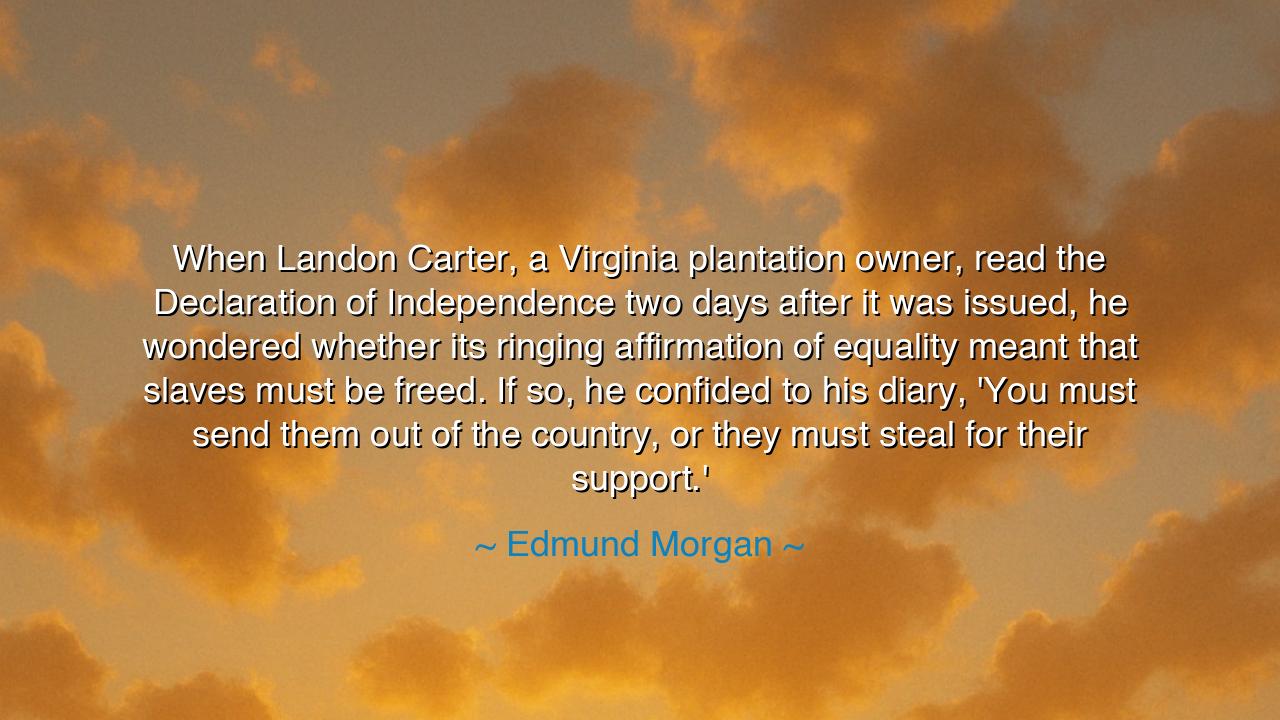
When Landon Carter, a Virginia plantation owner, read the
When Landon Carter, a Virginia plantation owner, read the Declaration of Independence two days after it was issued, he wondered whether its ringing affirmation of equality meant that slaves must be freed. If so, he confided to his diary, 'You must send them out of the country, or they must steal for their support.'






In the days when the ink of freedom was still wet upon the parchment, Landon Carter, a wealthy Virginia plantation owner, looked upon the Declaration of Independence and trembled. Its words proclaimed that “all men are created equal,” yet Carter’s fields were filled with men and women who toiled in bondage. In his heart, he felt the sting of contradiction. He asked himself whether this new gospel of liberty meant his slaves must be freed, and in a whisper of fear he wrote, “You must send them out of the country, or they must steal for their support.” Thus, Edmund Morgan, the historian, unearthed this moment of disquiet — a confession that exposed the moral fracture within the foundation of the young republic.
Here lies the seed of the American paradox: that the cry for freedom was born from the mouths of those who held others in chains. The quote speaks not merely of one man’s fear, but of a nation’s blindness. The Declaration of Independence, a hymn to human equality, was read by those who depended upon inequality for their survival. To Carter, liberty was a noble ideal — but one dangerous to the order that sustained him. His diary was not a declaration of conscience, but a shield against the guilt of privilege. He could imagine no world where the enslaved could live freely beside their former masters; he could only imagine exile or theft. Thus, his words reveal how fear, not hatred, often maintains injustice.
In this moment, we see the eternal struggle between principle and possession. The same hand that praises freedom can tighten the shackles of another. The same voice that sings of equality may tremble when that song demands sacrifice. Morgan’s quote is not about Carter alone, but about all who love virtue from a distance. It reminds us that it is easy to believe in justice when it costs nothing — and much harder when justice demands we change ourselves.
Consider the story of Thomas Jefferson, author of those immortal lines, who owned more than six hundred slaves. His words ignited revolutions across continents, yet he never freed the people who served him. Like Carter, he lived in the contradiction between truth and convenience, between the shining ideal of equality and the shadow of dependence. His life was a mirror of a nation divided against its own conscience. And so, history teaches us this: a people cannot be truly free until they face the truths they fear most.
The quote, therefore, is not a relic of the past but a mirror for the present. In every age, we find new forms of bondage — some visible, some hidden. There are still those who profit from the suffering of others, still those who justify inequality in the name of order, tradition, or survival. The spirit of Landon Carter whispers through time, warning us that freedom without empathy becomes hypocrisy, and equality without action becomes an illusion.
If we are to learn from Carter’s fear, we must act where he hesitated. We must confront our own comforts, our own systems that depend upon unseen labor, upon the pain of the voiceless. True liberty is not a gift to be enjoyed alone; it is a burden to be shared, a covenant that binds the strong to lift the weak. To be equal in word is easy; to be equal in deed is divine.
Therefore, my children of tomorrow, let this be your lesson: the measure of a free man is not how loudly he proclaims liberty, but how deeply he practices compassion. Do not flee from the cost of justice. Do not exile the inconvenient truth. For if we deny freedom to another, we imprison our own soul. Let your lives be a continuation of that unfinished declaration — not written on parchment, but carved in the choices you make each day.
And so, as the ancients would say: walk not as masters, but as stewards of one another’s dignity. For the true revolution of mankind begins not with swords or speeches, but with the courage to see every human being as yourself.






AAdministratorAdministrator
Welcome, honored guests. Please leave a comment, we will respond soon